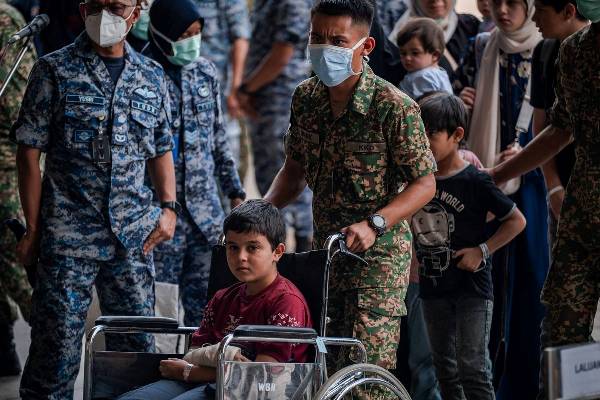In recent years, Israel’s crackdown on Palestinians has become the Indian benchmark in its own fight against minorities and KashmirisIn a flash, the aura of invincibility was shattered.
Images of Israeli commandos and soldiers being seized and taken hostage; of Hamas fighters paragliding over the all-domineering Israeli fence surrounding Gaza; of Israelis at a desert concert fleeing from oncoming Palestinian fighters; of Palestinians venturing into their families’ villages and towns for the first time since 1948 – all of this has left a trail of shock and awe in its wake.
The talking heads are all out, deliberating, debating, and speculating. But one thing is certain: the script has flipped.
And as the world tries to make sense of the weekend’s events, including the extent of the security breach and the situation on the ground, Hindu nationalists in India have embarked on an online campaign of their own: a robust show of support for Israel.
But first, just hours after Hamas launched its attack on the settler regime, Narendra Modi’s government issued an advisory for Indians in Israel.
And before most western leaders had even had their breakfast, Modi issued a statement expressing shock over the “terrorist attacks in Israel”.
“Our thoughts and prayers are with the innocent victims and their families,” he wrote on X. “We stand in solidarity with Israel at this difficult hour.”
Unhinged reactions
Not only did Modi’s reaction break with the country’s long-standing public position on Israel and Palestine, in which it has presented a decorum of neutrality, it also represented a departure from the rest of the Global South.
Modi’s erasure of Palestinians and unequivocal support for Israel was immediately replicated by several leaders, members and supporters of his Bharatiya Janata Party (BJP). The reactions ranged from vicious and nonsensical, to unhinged.
A former colonel in the Indian army, now an award-winning chief operating officer of a renewable energy firm, called on Israel to show Hamas “no mercy: no pity: no remorse”.
Both the Indian and Israeli governments have dedicated significant resources to exaggerating a sense of kinship online
A BJP member of the legislative assembly in the state of Karnataka casually noted that India “may face the situation that Israel is confronting today if we don’t stand up against Politically motivated Radicalism”, writing on X: “All these Hamas, Lashkar and ISI are from the same ‘Thought’ … They are Terrorists. The world should stand in #SolidarityWithIsrael.” His post was referencing the Pakistani armed group Lashkar-e-Taiba and Pakistan’s intelligence agency.
Some shared a video accusing Hamas fighters of beheading Israelis, with one noting: “They’re not humans, their faith makes them worse than animals … So-called ‘secular-liberals’ are supporting these p!gs?”
The video was later found to be from Syria in 2016. The video is still up on X, racking up more than two million views.
Others felt inclined to equate the Palestinian resistance with the rise of militancy against Indian occupation in Kashmir in 1990, invoking the debunked Hindu right-wing theory that Hindus suffered a genocide in Kashmir.
Still others shared an illustration of Modi holding Israeli Prime Minister Benjamin Netanyahu’s hand reassuringly as they walked towards fiery clouds ahead, or other images to express solidarity with Israel.
‘India is with Israel’
The flood of support and the helpful disinformation campaign didn’t go unnoticed. The effort was so effective in the narrative war playing out online that the official X page for the state of Israel shared a screen grab of “India is with Israel” trending on the social app, and thanked India for its generous support.
On Sunday, Naor Gilon, Israel’s ambassador to New Delhi, said he was buoyed by the enthusiasm to help Israel, which saw several Indians come forward to volunteer for the war effort (although he added that Israel didn’t need others to fight its fight).
Of course, the hysterical show of support from India towards Israel is not new.
Thousands of right-wing Indians on social media have long expressed support for Israel, most notably during Israel’s bombardment of Gaza in May 2021, which killed more than 250 Palestinians, including more than 60 children, and injured thousands more. At the time, hashtags such as #ISupportIsrael, #IndiaWithIsrael, #IndiaStandsWithIsrael, #IsraelUnderFire and #PalestineTerrorists, trended on Indian social media.
Ever since India normalised ties with Israel in 1992, military relations between Tel Aviv and New Delhi have comprised the bedrock of the relationship. After 9/11, security ties deepened further, with India purchasing around $1bn worth of arms from Israel annually.
But it has been under Modi that India’s transformation from reluctant friend of Israel to close ally became complete. When Modi became prime minister in 2014, on the mandate of turning India into a Hindu nationalist state, he looked to Netanyahu as a leader to emulate: an unashamed head of a militaristic, ethno-nationalist state.
Economic interests
In 2017, Modi became the first Indian prime minister to visit Israel, in a visit that saw the two nations establish a strategic partnership, working closely on cyber security, weapons manufacturing, agriculture and water management. Between 2015 and 2019, Israeli exports to India increased by 175 percent, making India the biggest purchaser of Israeli weapons.
Under the auspices of the recently established West Asia quad (comprising India, Israel, the United Arab Emirates and the United States), India has become fundamental in helping to integrate Israel within the Middle East, as well as aiding Washington as it challenges China in the region.
With the Indian company Adani Ports and Special Economic Zone now owning 70 percent of the Haifa port, a vital node in the Abraham Accords and in Washington’s anti-China positioning, India’s support for Israel is not merely rhetorical. It is now vital to New Delhi’s economic vision to become an alternate supply chain for the West.
Part of the project to bolster ties between India and Israel has involved a deliberate attempt to improve people-to-people relations between the two countries. Both the Indian and Israeli governments have dedicated significant resources to exaggerating a sense of kinship online, promoting religious events and political milestones, and creating an impression of deep cultural investment in each other’s countries.
This has been backed by several new initiatives and programmes, with Israeli NGOs operating deep within the slums of Mumbai and other parts of the country, bringing Israeli backpackers as volunteers. Israel has also opened dozens of agricultural centres that are touted as technological exchange programmes for farmers, but invariably have links to the Israeli military.
Israeli weapons manufacturers have also been working closely with Indian companies, co-producing semi-automatic weapons and drones.
Shifting image
At the same time, many Indians, including celebrities, have been flocking to Israel like never before, shifting its image among the general public.
“Many Indians knew Israel only through the mainstream media – and they showed only the conflict part,” an official at Israel’s tourism ministry told Haaretz in 2018. “Once we started our campaign [in 2017], Indians started to realise the tourism aspect of Israel, which then opened their eyes. After all, Israel is not only about the Holy Land and conflict. There is also fun, people and history.”
Like Israel, India wants to be the oppressor and the oppressed – or at least go down trying
Today, there are around 18,000 Indian citizens in Israel, working as caregivers, IT professionals, diamond traders and students. There are also around 85,000 Jews of Indian origin in Israel.
An increasing number of scholarships and opportunities are encouraging Indian students to venture to Israel. And when Netanyahu visited India in 2018, he met Bollywood stars, as the film industry pledged to work more closely with Tel Aviv.
Fauda, the hit television show about an elite Israeli counter-terrorism outfit battling Palestinian “terrorists” from the occupied West Bank and Gaza, proved to be such a success in India that a local production company created a spin-off called Tanaav, featuring an Indian counter-terrorism unit battling “terrorists” in Kashmir.
The new Bollywood-Israel crossover film Akelli, starring Fauda’s Tsahi Halevi, also predictably revolves around Muslim “terrorism”. In this case, an Indian damsel finds herself in distress in a Muslim country under the rule of the Islamic State and needs to be rescued, reinforcing once more the trope of the ravenous, perverted Muslim male terrorist.
The benchmark
Hodaya Avzada, a former Israeli diplomat to New Delhi, has said that she believes Indians look up to Israel as a country to emulate.
“They [Indians] look at Israel as a trademark of quality, and look up to us in so many ways,” she said at a public event in London earlier this year. “Israel was a country created from nothing, had no natural resources, no nothing, and then became this regional superpower.”
Avzada added that Hindus in India draw parallels with the situation of Jews in Israel: “They feel like they have to protect Hinduism, which in a lot of ways is a national feeling rather than just being a religion.”
This adds up. Like Israel, India wants to be the oppressor and the oppressed – or at least go down trying.
Over the past decade in particular, Israel’s methods against Palestinians have become the Indian benchmark for its own actions against minorities and Kashmiris. Historic Jewish struggles against antisemitism, and its weaponisation against Palestinians, have contributed to a handy playbook for delegitimising critics of India or Hindu nationalism.
An attack on Israel is now an attack on India, for the latter’s own self-image is also at stake.
Post Disclaimer | Support Us
Support Us
The sailanmuslim.com web site entirely supported by individual donors and well wishers. If you regularly visit this site and wish to show your appreciation, or if you wish to see further development of sailanmuslim.com, please donate us
IMPORTANT : All content hosted on sailanmuslim.com is solely for non-commercial purposes and with the permission of original copyright holders. Any other use of the hosted content, such as for financial gain, requires express approval from the copyright owners.
 Sri lanka Muslims Web Portal Sri Lanka Muslims News Center
Sri lanka Muslims Web Portal Sri Lanka Muslims News Center

 Donate
Donate


